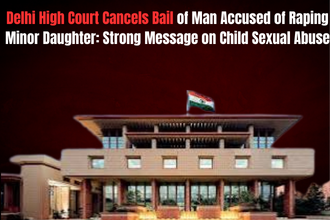In a significant judgment reaffirming the boundaries of criminal law in cases involving consensual relationships, the Supreme Court of India has quashed a rape case against a former judicial officer, stating that every breach of promise to marry does not amount to rape unless it is proven that the consent was obtained through fraud from the outset. This ruling was delivered in the case Biswajyoti Chatterjee v. State of West Bengal & Anr., cited as 2025 LiveLaw (SC) 404.
Background of the Case
The complainant, a 36-year-old woman, had her divorce case pending before the appellant, a judicial officer, in 2014. During this period, the two developed a close relationship, eventually leading to a consensual sexual relationship. The complainant alleged that the appellant had promised to marry her after her divorce, but after the divorce was finalized, he cut off all contact.
Following this, the complainant filed an FIR against the appellant under Sections 376(2)(f) (rape by deceit), 417 (cheating), and 506 (criminal intimidation) of the Indian Penal Code. The Sessions Court and the High Court rejected the appellant’s plea for discharge, prompting him to appeal to the Supreme Court.
Supreme Court’s Observations
The bench comprising Justices BV Nagarathna and Satish Chandra Sharma made crucial observations regarding the nature of consensual relationships and the misuse of rape laws in the aftermath of breakups. The Court highlighted a “growing trend” of initiating criminal proceedings when relationships turn sour and emphasized that not every failed promise of marriage constitutes a false pretext to induce sexual relations.
“Every consensual relationship, where a possibility of marriage may exist, cannot be given a colour of a false pretext to marry, in the event of a fallout,” the Court noted.
The Court held that the complainant, being a mature and educated woman, was fully aware that the appellant was married (though separated) and yet chose to continue the relationship. Therefore, her consent could not be said to be vitiated by a misconception of fact.
Key Legal Findings
- No Fraudulent Intent Proven:
Justice Satish Chandra Sharma, who authored the judgment, noted that the prosecution failed to establish that the appellant never intended to marry the complainant at the time of making the promise. - Knowledge of Existing Marriage:
The complainant was fully aware that the appellant was in a subsisting marriage. Her decision to engage in a physical relationship was made with this knowledge, nullifying any claim of fraud. - Prolonged Consensual Relationship:
The relationship continued for more than a year, and the Court found it improbable that the complainant engaged in sexual relations solely on account of a marriage promise. Citing Prashant Bharti v. State of NCT of Delhi, the bench reiterated that a prolonged consensual relationship negates the argument of coercion or misconception. - Abuse of Criminal Process:
The Court declared that the initiation of criminal proceedings in this case amounted to an abuse of the legal process and deemed it fit to quash the FIR at the stage of framing charges.
Landmark Implications of the Judgment
This verdict reinforces the principle that sexual relationships between consenting adults do not automatically attract criminal liability, especially in the absence of clear evidence of deceit or coercion. It also sets a precedent for evaluating similar cases where relationships end in allegations of rape based on broken promises of marriage.
The judgment sends a strong message against the misuse of rape laws, cautioning that criminal law should not be weaponized to settle scores arising from failed personal relationships.
When Can Sex on the Promise of Marriage Amount to Rape?
The Supreme Court has laid down clear parameters in previous rulings for when sex under a promise to marry can be considered rape:
- False Promise from the Outset: If it is shown that the accused never intended to marry the complainant and made a promise solely to obtain consent for sex, it constitutes rape under Section 375 IPC.
- Misconception of Fact: If the consent was obtained by deception, misrepresentation, or fraud, the act could fall within the definition of rape.
- Voluntary Consent: However, if the woman voluntarily enters into a relationship knowing the circumstances (such as an ongoing marriage or uncertainty about future marriage), it cannot be termed as rape.
Previous Supreme Court Observations on Similar Issues
This ruling aligns with the Court’s consistent stance in recent years. In multiple cases, the apex court has:
- Expressed concern over the “worrying trend” of using criminal law against men after consensual relationships turn sour.
- Quashed cases where highly educated women alleged rape after years of consensual relationships under the purported promise of marriage.
- Reaffirmed that a mere breakup or refusal to marry does not amount to rape unless backed by fraudulent intent.
Conclusion
The Supreme Court’s ruling in Biswajyoti Chatterjee v. State of West Bengal & Anr. is a pivotal addition to the jurisprudence on false rape allegations arising from failed relationships. It balances the need to protect genuine victims of sexual assault while ensuring that criminal law is not misused to harass or intimidate individuals after the breakdown of consensual relationships.
By emphasizing the importance of consent, awareness, and intent, the judgment reinforces the legal principle that not every promise to marry—followed by a breakup—amounts to rape.


